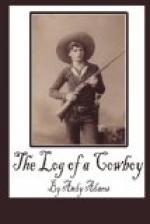[Illustration: MEETING WITH INDIANS]
His first question, instead, was to know the distance to Fort Sill and Fort Elliot. The next was how many days it would take for cavalry to reach him. He then had us narrate the fact that when the first herd of cattle passed through the country less than a month before, some bad Indians had shown a very unfriendly spirit. They had taken many of the cattle and had killed and eaten them, and now the great white man’s chief at Washington was very much displeased. If another single ox were taken and killed by bad Indians, he would send his soldiers from the forts to protect the cattle, even though their owners drove the herds through the reservation of the Indians—over the grass where their ponies grazed. He had us inform the chief that our entire herd was intended by the great white man’s chief at Washington as a present to the Blackfeet Indians who lived in Montana, because they were good Indians, and welcomed priests and teachers amongst them to teach them the ways of the white man. At our foreman’s request we then informed the chief that he was under no obligation to give him even a single beef for any privilege of passing through his country, but as the squaws and little papooses were hungry, he would give him two beeves.
The old chief seemed not the least disconcerted, but begged for five beeves, as many of the squaws were in the encampment across the North Fork, those present being not quite half of his village. It was now getting late in the day and the band seemed to be getting tired of the parleying, a number of squaws having already set out on their return to the village. After some further talk, Flood agreed to add another beef, on condition they be taken to the encampment before being killed. This was accepted, and at once the entire band set up a chattering in view of the coming feast. The cattle had in the mean time grazed off nearly a mile, the outfit, however, holding them under a close herd during the powwowing. All the bucks in the band, numbering about forty, now joined us, and we rode away to the herd. I noticed, by the way, that quite a number of the younger braves had arms, and no doubt they would have made a display of force had Flood’s diplomacy been of a more warlike character. While drifting the herd back to the trail we cut out a big lame steer and two stray cows for the Indians, who now left us and followed the beeves which were being driven to their village.




